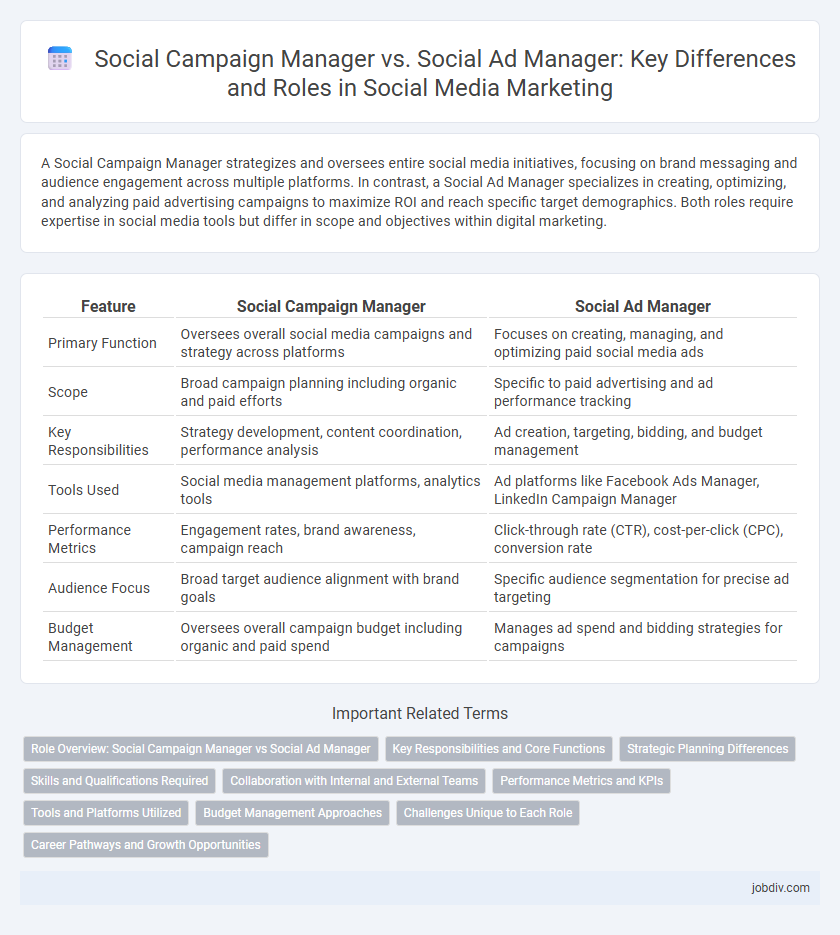A Social Campaign Manager strategizes and oversees entire social media initiatives, focusing on brand messaging and audience engagement across multiple platforms. In contrast, a Social Ad Manager specializes in creating, optimizing, and analyzing paid advertising campaigns to maximize ROI and reach specific target demographics. Both roles require expertise in social media tools but differ in scope and objectives within digital marketing.
Table of Comparison
| Feature | Social Campaign Manager | Social Ad Manager |
|---|---|---|
| Primary Function | Oversees overall social media campaigns and strategy across platforms | Focuses on creating, managing, and optimizing paid social media ads |
| Scope | Broad campaign planning including organic and paid efforts | Specific to paid advertising and ad performance tracking |
| Key Responsibilities | Strategy development, content coordination, performance analysis | Ad creation, targeting, bidding, and budget management |
| Tools Used | Social media management platforms, analytics tools | Ad platforms like Facebook Ads Manager, LinkedIn Campaign Manager |
| Performance Metrics | Engagement rates, brand awareness, campaign reach | Click-through rate (CTR), cost-per-click (CPC), conversion rate |
| Audience Focus | Broad target audience alignment with brand goals | Specific audience segmentation for precise ad targeting |
| Budget Management | Oversees overall campaign budget including organic and paid spend | Manages ad spend and bidding strategies for campaigns |
Role Overview: Social Campaign Manager vs Social Ad Manager
A Social Campaign Manager oversees the strategic planning, execution, and performance analysis of multifaceted social media initiatives to achieve broader brand goals, integrating content, engagement, and paid media. In contrast, a Social Ad Manager specializes in creating, managing, and optimizing paid advertising campaigns across social platforms, focusing on audience targeting, budget allocation, and ROI metrics. Both roles require analytical skills and platform expertise but differ in scope, with Campaign Managers handling end-to-end campaign strategies and Ad Managers concentrating on paid media effectiveness.
Key Responsibilities and Core Functions
Social Campaign Managers develop and oversee strategic plans for multi-channel social media campaigns, coordinating content creation, audience targeting, and performance analysis to drive brand awareness and engagement. Social Ad Managers specialize in managing paid advertising efforts on social platforms, focusing on ad creation, budget allocation, bid management, and detailed optimization to maximize ROI and conversion rates. Both roles require data-driven decision-making but differ in scope, with Campaign Managers handling broader campaign strategies and Ad Managers concentrating on tactical ad execution and performance.
Strategic Planning Differences
Social Campaign Managers focus on overarching strategic planning, aligning social campaigns with brand goals, audience targeting, and content themes for long-term engagement. Social Ad Managers specialize in tactical execution, optimizing ad spend, bid strategies, and real-time adjustments for immediate campaign performance. Campaign Managers develop integrated plans across multiple channels, while Ad Managers concentrate on maximizing ROI through data-driven ad placements on specific platforms.
Skills and Qualifications Required
Social Campaign Managers require strategic planning skills, proficiency in audience segmentation, and expertise in content creation to drive engagement across various platforms. Social Ad Managers need strong analytical abilities, experience with ad platforms like Facebook Ads Manager and Google Ads, and knowledge of bidding strategies to optimize campaign ROI. Both roles demand excellent communication skills and an understanding of social media metrics to measure and enhance campaign performance effectively.
Collaboration with Internal and External Teams
Social Campaign Managers excel in coordinating with internal marketing teams and external creative agencies to ensure cohesive brand messaging and campaign alignment across multiple platforms. Social Ad Managers focus on executing paid social strategies, collaborating closely with analytics experts and media buyers to optimize ad performance and budget allocation. Effective collaboration between these roles drives seamless campaign execution, maximizes ROI, and enhances overall brand presence on social networks.
Performance Metrics and KPIs
Social Campaign Managers prioritize overall campaign performance metrics such as reach, engagement rate, and conversion rates to evaluate the effectiveness of integrated social strategies. Social Ad Managers focus more granularly on KPIs like click-through rate (CTR), cost per click (CPC), and return on ad spend (ROAS) to optimize paid advertising efforts. Both roles rely on data analytics tools, but their key performance indicators differ based on strategic versus tactical execution.
Tools and Platforms Utilized
Social Campaign Managers primarily utilize tools like Hootsuite, Sprout Social, and Buffer to schedule posts, monitor engagement, and analyze social media performance across multiple platforms. Social Ad Managers often rely on Facebook Ads Manager, Google Ads, and LinkedIn Campaign Manager to create, manage, and optimize paid advertising campaigns with in-depth targeting and budget control. Both roles leverage analytics platforms such as Google Analytics and native social insights to track campaign effectiveness and audience behavior.
Budget Management Approaches
Social Campaign Managers typically oversee comprehensive budget allocation across multiple platforms, ensuring cohesive spending aligned with overarching marketing goals. Social Ad Managers focus on granular budget control within specific advertising accounts, optimizing daily spend and bid strategies to maximize ROI on targeted campaigns. Effective budget management integrates strategic planning at the campaign level with tactical adjustments in ad execution.
Challenges Unique to Each Role
Social Campaign Managers face challenges in coordinating multiple platforms simultaneously, ensuring consistent messaging and brand voice across diverse audiences. Social Ad Managers navigate complexities in budget allocation, bid strategies, and real-time performance optimization to maximize ROI on paid social campaigns. Both roles require distinct expertise in analytics interpretation and adapting to evolving social media algorithms, which shapes their unique operational hurdles.
Career Pathways and Growth Opportunities
Social Campaign Managers specialize in strategizing and executing multi-channel campaigns, leading to career growth in marketing strategy, brand management, and digital communication roles. Social Ad Managers focus on optimizing paid social media ads, which opens pathways to careers in media buying, performance marketing, and data analytics. Both roles offer advancement opportunities in digital marketing leadership, with Social Campaign Managers often progressing toward broader campaign oversight and Social Ad Managers toward specialized advertising strategy and budget management.
Social Campaign Manager vs Social Ad Manager Infographic

 jobdiv.com
jobdiv.com